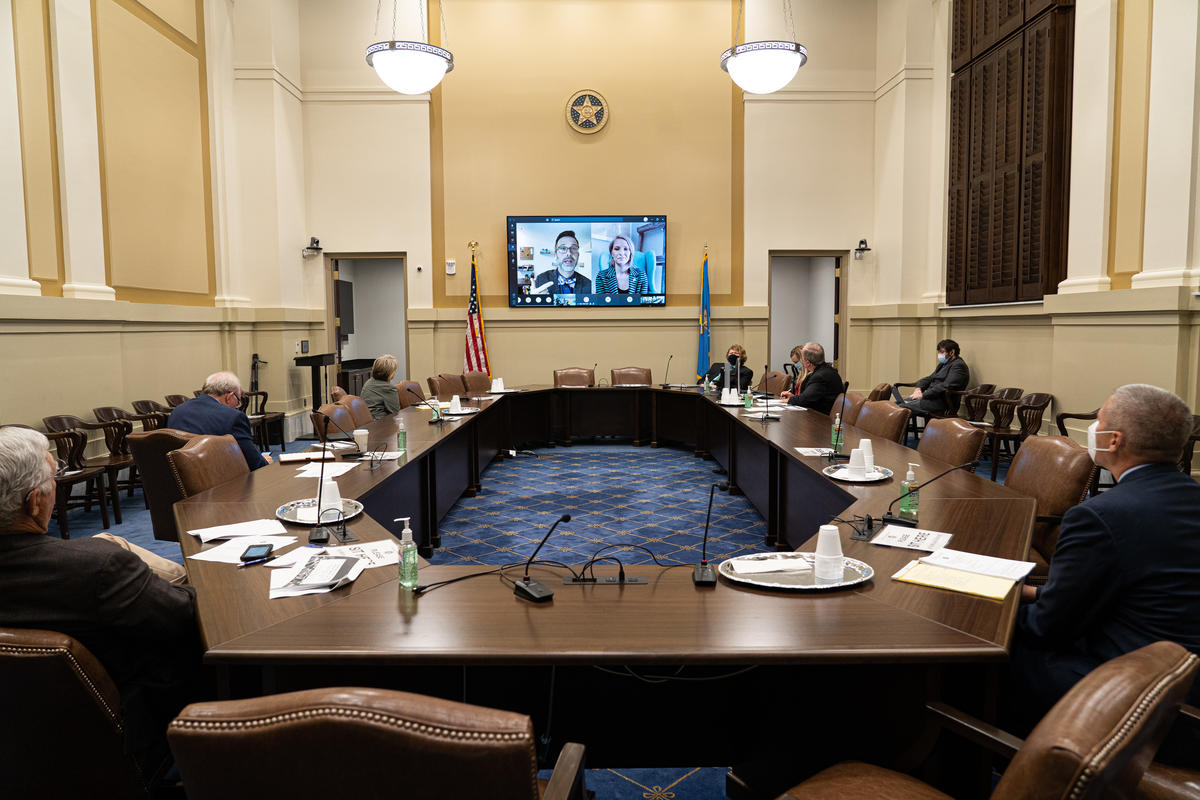Senate Committee hears recommendations for improving health outcomes for individuals with diabetes in Oklahoma
 Dr. David Sparling discusses diabetic patient care in Oklahoma before the Senate Retirement and Insurance Committee Tuesday alongside Sen. Carri Hicks.
Dr. David Sparling discusses diabetic patient care in Oklahoma before the Senate Retirement and Insurance Committee Tuesday alongside Sen. Carri Hicks.
OKLAHOMA CITY – The Senate Retirement and Insurance Committee held a meeting Tuesday to study ways to improve health outcomes for Oklahomans with diabetes. The interim study was requested by Oklahoma Legislative Diabetes Caucus co-chair Sen. Carri Hicks, D-Oklahoma City, whose son has Type 1 diabetes.
“Diabetes affects one in eight adults in the U.S. but is expected to grow to one in four by 2050. This is disturbing given that currently $1 of every $4 spent in America’s healthcare system is for diabetes. There are steps we can take to help create significant cost-savings to the state while improving the quality of life of Oklahomans with diabetes and preventing unnecessary deaths,” Hicks said. “This is the third year I’ve been working to bring together doctors, pharmacists, patients, healthcare organizations and other diabetes advocates to figure out how to improve our healthcare system as well as provide better access to the life-saving tools and resources available in our state.”
Hicks pointed out that the most recent statute dealing with lowering diabetes costs in the state is from 1996 yet technology and treatment has changed significantly since that time. She is continually working with various groups to find ways to improve the quality of life for individuals with diabetes to prevent unnecessary deaths and mitigate long-term risks while also lowering the cost to the state.
The committee first heard from University of Oklahoma College of Medicine Assistant Professor of Pediatric Diabetes and Endocrinology and CHF Paul and Ann Milburn Chair in Pediatric Diabetes, Dr. David Sparling. He explained the importance of continuity of care and patient choice when it comes to medications and supplies as well as problems caused by constantly changing insurance restrictions. Sparling stressed, across all insurance forms, the base of care should be the American Diabetes Association’s (ADA) Standards of Care, with comprehensive coverage of all options including preventative care. Insurance in Oklahoma does not always allow patients to utilize new equipment or treatments as they become available, which puts Oklahomans with diabetes in danger.
Presentations were also made by Stewart Perry, chair of the Diabetes Leadership Council, and George Huntley, vice president of the Diabetes Leadership Council. Their presentation focused on state-based solutions for improving health outcomes for individuals with diabetes and lowering costs to patients and the states. They shared three solutions including:
- Eliminating consumer exposure to drug list prices in state-regulated health plans. This includes covering chronic disease management as preventive (pre-deductible); capping cost-sharing for insulin and supplies per prescription and/or per month; and banning co-pay accumulators and maximizers.
- Actively managing state contractors to eliminate reverse insurance and improve transparency. This would include transitioning to fee-based insurance and PBM contracts in Medicaid managed care and state employee health plans.
- Improve access to essential tools for diabetes self-management.
Perry and Huntley praised Oklahoma for executing three important aspects of improving access to self-management tools including passing Kevin’s Law in 2018 to allow emergency dispensing of a 30-day supply of insulin; establishing the nation’s first Legislative Diabetes Caucus which meets monthly to work on the state’s Diabetes Action Plan; and enacting Safe at School legislation. The pair said another way the state can help is by adequately covering Continuous Glucose Monitors (CGMs), pumps, diabetes education and other tools in Medicaid.
Hicks shared her firsthand experience of how coverage and resources can save a life. Last winter, her son suffered through a 72-hour bout with a flu-like illness. Thanks to the constant assistance of a Certified Diabetes Educator, her son was able to get through the illness safely. Sadly, the same month another family in the Metro facing similar circumstances lost their child to Diabetic Keto Acidosis, because they did not have a Certified Diabetes Educator to help them through the complexities.
“Your parents’ insurance, income, nor any other factor should keep those living with diabetes from having proper continuity of care or access to the medications, medical equipment or other resources they need to live healthy lives,” Hicks said.
The study’s presentations are available on the Senate website at https://oksenate.gov/publications/senate-interim-studies/examining-diabetes-standards-care-and-needed-insurance-coverage.
For more information, contact: Sen. Carri Hicks: (405) 521-5543 or Carri.Hicks@oksenate.gov
MAKE IT COUNT OKLAHOMA! An undercount in the census of just 2 percent can cost the state $1.8 billion in lost federal money over the next 10 years. Fill out your census form, Oklahoma. Learn more at: www.2020census.gov.
 Oklahoma Senate
Oklahoma Senate

